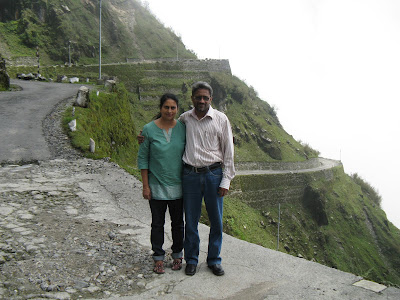When you have conquered
certain heights you can’t descend any more. You spread your wings and fly. Richard
Bach said something similar in one of his two famous books. He was speaking
metaphorically about the quality of your life, of your thinking, of your
attitudes. But when you are on the mountains, that axiomatic saying holds good
literally too. When you conquer one peak, the next higher peak beckons you
bewitchingly. You want to climb that too. And the next one too. And it goes on.
The mountains urge you to go higher and higher.
I spent the
most worthwhile period of my life on the mountains of Shillong. Fifteen years.
They should have been the happiest years of my life. I loved the mountains. I
still do. But Shillong turned out to be the bitterest part of my life. That’s
one of the ironies of life. When you’re only conquering peaks, the same ones,
ad infinitum, from home to workplace and back, from home to water source and
back with buckets of water in both hands, from home out on leisurely walks or
rides and back, the peaks lose their charm. Peaks become “quotidian,” to use
the favourite word one of my philosopher-friends.
Mountains
have protean faces. The mountain that lies opposite your house which is on
another mountain has infinite faces. What you see in the morning is not what
you see in the evening. Or at any time of the day, in fact. Even the weather in
the mountains is terribly unpredictable. Now it rains and now it shines.
Dr S C Biala
who was the principal of my school in Delhi for a brief while will vouch for
the unpredictability of the weather in the mountains. He was a mountaineer. He
has taken many people including me on trekking in the Himalayas. He has written
books on trekking in the Garhwal Himalayas. Now as an elderly person he still
guides aspiring trekkers via his YouTube channel. His
initiative took me along with some students to many places in the Himalayas
such as Hemkund and Gomukh, Gangotri and Yamunotri, Badrinath and Kedarnath.
Exotic places, thrilling treks. Most importantly, bewitching mountains. The snow-capped
peaks ahead of you keep calling you as the sirens called Ulysses from the
musical island.
I have
descended, however. No, Richard Bach is not wrong. I have descended from the
mountains to live my own life. But my thinking still flies on enormous wings.
It will continue to fly. I refuse to descend. Thank you, Bach. And thank you,
Dr Biala. The mountains of Shillong betrayed me, however. So, they have to wait
and earn my gratitude.
Mountains don’t
forgive easily. Have you ever realised that? Wait for the next avalanche from Siachen.

Hari OM
ReplyDeleteThe mountains are merely observers, acheless and without need to forgive. They are not responsible for what happens upon or among them - even the avalanches result from situations external to them. All the mountains can do is watch. YAM xx
Just today in one class I told a student that literature teacher's statements are not like mathematical theorems. No logic of the brain. It's metaphor. My mountains and my glaciers and my avalanches speak a non-mathematical language.
DeleteLoved reading this
ReplyDeleteThank you
DeleteMountains are beautiful but they take a lot out of you. I come from Garhwal and can understand what you experienced in shillong. Life is difficult in the mountains and often the youth is forced to move out to earn livelihood as I had to. But I'll like nothing better to move back and have started working towards that. I guess I still am a pahari at heart as I still feel like an alien in cities and plains.
ReplyDeleteProbably most people love their birthplaces more than others. I love your expression 'pahari at heart'. One thing I've noticed is that 'paharis' have more internal goodness compared to the plains people.
DeleteBeing born and brought up in dry plains, I dreamed mountains always. I look up and adore its beauty and admire its colossal structure. We transform our fear into several acts of worship. Comparing it with our life/thinking/attitude is interesting.
ReplyDeleteMountains have a peculiar charm. They do alter our thinking and attitudes.
Delete